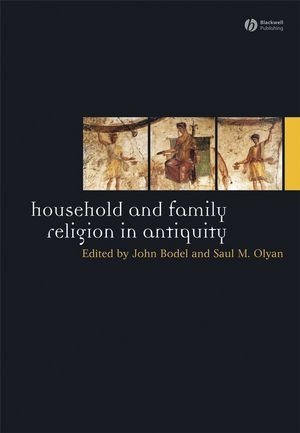Read more
Informationen zum Autor John Bodel is Professor of Classics and History at Brown University. He writes about Roman social and cultural history, Latin epigraphy, and Latin literature of the Empire. His books include Roman Brick Stamps in the Kelsey Museum (1983), Graveyards and Groves: A Study of the Lex Lucerina (1994), Epigraphic Evidence: Ancient History from Inscriptions (editor, 2001), and Dediche sacre nel mondo greco-romano: Diffusione, funzioni, tipologie (edited with Mika Kajava, 2008). Saul M. Olyan is Samuel Ungerleider Jr. Professor of Judaic Studies and Professor of Religious Studies, Brown University. He is the author of Asherah and the Cult of Yahweh in Israel (1988), A Thousand Thousands Served Him: Exegesis and the Naming of Angels in Ancient Judaism (1993), Rites and Rank: Hierarchy in Biblical Representations of Cult (2000), Biblical Mourning: Ritual and Social Dimensions (2004), and Disability in the Hebrew Bible: Interpreting Mental and Physical Differences (2008). Klappentext The first book to explore the religious dimensions of the family and the household in ancient Mediterranean and West Asian antiquity.* Advances our understanding of household and familial religion, as opposed to state-sponsored or civic temple cults* Reconstructs domestic and family religious practices in Egypt, Greece, Rome, Israel, Mesopotamia, Ugarit, Emar, and Philistia* Explores many household rituals, such as providing for ancestral spirits, and petitioning of a household's patron deities or of spirits associated with the house itself* Examines lifecycle rituals - from pregnancy and birth to maturity, old age, death, and beyond* Looks at religious practices relating to the household both within the home itself and other spaces, such as at extramural tombs and local sanctuaries Zusammenfassung This book aims to advance our understanding of household and family religion in Mediterranean and West Asian antiquity, as opposed to state-sponsored or civic temple cults. The volume explores the new recognition that religious expression associated with household, family, and domicile is significant and must be investigated in a serious way. Inhaltsverzeichnis List of Figures vii Notes on Contributors x Series Editor's Preface xiii Acknowledgments xv Map xvi 1 Introduction 1 John Bodel and Saul M. Olyan 2 Theorizing the Religion of Ancient Households and Families 5 Stanley K. Stowers 3 Family Religion in Second Millennium West Asia (Mesopotamia, Emar, Nuzi) 20 Karel van der Toorn 4 The Integration of Household and Community Religion in Ancient Syria 37 Daniel E. Fleming 5 Family, Household, and Local Religion at Late Bronze Age Ugarit 60 Theodore J. Lewis 6 Family Religion in Ancient Israel and its Surroundings 89 Rainer Albertz 7 Family Religion in Israel and the Wider Levant of the First Millennium bce 113 Saul M. Olyan 8 Household Religion, Family Religion, and Women's Religion in Ancient Israel 127 Susan Ackerman 9 Ashdod and the Material Remains of Domestic Cults in the Philistine Coastal Plain 159 Rüdiger Schmitt 10 Household Religion in Ancient Egypt 171 Robert K. Ritner 11 Household and Domestic Religion in Ancient Egypt 197 Barbara S. Lesko 12 Household Religion in Ancient Greece 210 Christopher A. Faraone 13 Family Matters: Domestic Religion in Classical Greece 229 Deborah Boedeker 14 Cicero's Minerva, Penates , and the Mother of the Lares : An Outline of Roman Domestic Religion 248 John Bodel 15 Comparative Perspectives 276 John Bodel and Saul M. Olyan Bibliography 283 Inde...
List of contents
List of Figures vii
Notes on Contributors x
Series Editor's Preface xiii
Acknowledgments xv
Map xvi
1 Introduction 1
John Bodel and Saul M. Olyan
2 Theorizing the Religion of Ancient Households and Families 5
Stanley K. Stowers
3 Family Religion in Second Millennium West Asia (Mesopotamia, Emar, Nuzi) 20
Karel van der Toorn
4 The Integration of Household and Community Religion in Ancient Syria 37
Daniel E. Fleming
5 Family, Household, and Local Religion at Late Bronze Age Ugarit 60
Theodore J. Lewis
6 Family Religion in Ancient Israel and its Surroundings 89
Rainer Albertz
7 Family Religion in Israel and the Wider Levant of the First Millennium bce 113
Saul M. Olyan
8 Household Religion, Family Religion, and Women's Religion in Ancient Israel 127
Susan Ackerman
9 Ashdod and the Material Remains of Domestic Cults in the Philistine Coastal Plain 159
Rüdiger Schmitt
10 Household Religion in Ancient Egypt 171
Robert K. Ritner
11 Household and Domestic Religion in Ancient Egypt 197
Barbara S. Lesko
12 Household Religion in Ancient Greece 210
Christopher A. Faraone
13 Family Matters: Domestic Religion in Classical Greece 229
Deborah Boedeker
14 Cicero's Minerva, Penates, and the Mother of the Lares: An Outline of Roman Domestic Religion 248
John Bodel
15 Comparative Perspectives 276
John Bodel and Saul M. Olyan
Bibliography 283
Index 314

